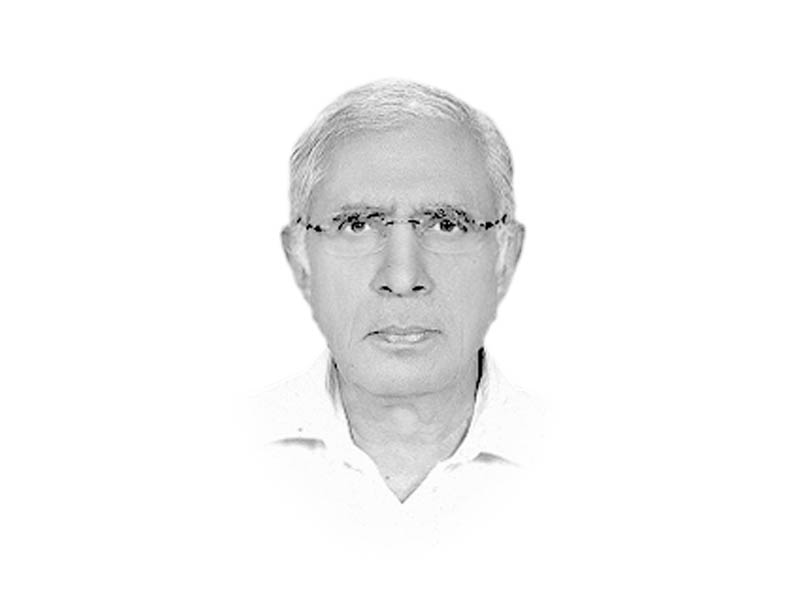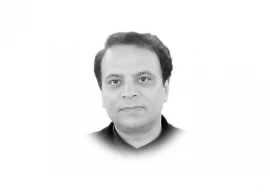
The impression one gets from all the talk about the innumerable problems that beset Pakistan today is of a sailless ship trapped in a stormy sea and being tossed around by onrushing waves from all directions. The conventional wisdom all through these years has been that once democracy is allowed to take roots, everything would fall in place and the will and the votes of the people would extricate the nation from the bottomless pit it is sliding into. But midway through the transition to this comfort zone — democracy — forces from within have started rejecting at gunpoint, the system of one person one vote because in their obscurantist wisdom, there is no place for modernity in Islam.
The mainstream political parties, which have the biggest stakes in democracy and should be extremely worried at the ongoing blood-letting, seem to have chosen not to confront the forces that are challenging the very writ of the state and its Constitution. Instead, they have been following a policy of appeasement, abandoning the defenceless masses at the mercy of gun-toting hordes. A minuscule but vibrant part of our media has, however, kept a window open for those, who dare to challenge the forces that murder and maim with full impunity in the name of Islam. And over the last several years, a number of good books, both in English and Urdu, written by Pakistani and foreign political thinkers and sociologists, have also appeared, which effectively counter the obscurantist propaganda being mounted by the hate-mongers.
One of the latest additions to this not-so-long a list of cerebral books on Pakistan appeared just about the time the May 11 elections results were being announced. It is an extensively researched book with lots of authentic statistics and a weighty bibliography. The book — What’s wrong with Pakistan? — covers almost every aspect of Pakistan right from its very genesis. It is divided in six parts and has 34 chapters. And believe me, every chapter is a book in itself but the author, Babar Ayaz, a veteran journalist and my former colleague in Dawn, has done justice to every issue he chose to dissect and discuss in the book, spread over no more than 347 pages. He has asked many searching, and at times, very disturbing questions and some of his answers are as disturbing and some are highly disquieting. One gets the feeling that he has written the book with foreign readers in mind, but there are many aspects discussed in the narrative, which would perhaps, be totally new and shocking to even Pakistanis, especially those who have had the misfortune of being exposed to only that version of our history that one finds in our school and college textbooks.
On page 318, he remarks: But the worrying point is that there is little debate in Pakistan on why religious extremism is violent and then he lists five highly relevant questions that he says should be debated and explored by social scientists. 1) Is religious extremism a new phenomenon or was it embedded in the Pakistan movement in undivided India? 2) Is religious extremism spreading and strengthening in Pakistan? 3) Does it (religious extremism) appear to be expanding because religious extremists are using terrorist tactics to achieve their ideological goals? 4) What external and internal factors have sharpened the contradiction between religious extremists and modernists? 5) And is the contradiction between religious extremism and modernity specific to Muslim societies, or are other major religions also inflicted with this malaise? The answers he gives are both stimulating and vexing.
Published in The Express Tribune, August 14th, 2013.
Like Opinion & Editorial on Facebook, follow @ETOpEd on Twitter to receive all updates on all our daily pieces.
COMMENTS (8)
Comments are moderated and generally will be posted if they are on-topic and not abusive.
For more information, please see our Comments FAQ


1734780406-0/Untitled-(11)1734780406-0-165x106.webp)
1734778885-0/Untitled-(10)1734778885-0-165x106.webp)
1734776708-0/Untitled-(8)1734776708-0-165x106.webp)




1734686655-0/Express-Tribune-(10)1734686655-0-270x192.webp)





1734587529-0/Express-Tribune-(1)1734587529-0-270x192.webp)




Defining a State in terms of religion is wrong whether it is Pakistan or Israel. Of course taking religion as a base, hatred & divide was embedded in the thought process of creating Pakistan. Religion is strictly for oneself to grow here and here-after. unfortunately the thought process is of world-domination and not to grow. Catalysts for WORLD DOMINATION 1. We use to rule this much of the land 2. UMMAH should be united to rule the world Ruling and growing with humanity are very distinct and separate endeavors. History of the world did not praise whoever tried to rule it. Weather it was Persians, Pharohs, Britishers or the Americans now.
As a next stage of the evolution for Mankind we need to learn to grow by growing each other and not dominate and rule.We should watch startrek series more often. It sure does contain pearls of wisdom. Captain Jean-Luc Picard: The economics of the future are somewhat different. You see, money doesn't exist in the 24th century. Lily Sloane: No money? You mean, you don't get paid? Captain Jean-Luc Picard: The acquisition of wealth is no longer the driving force of our lives. We work to better ourselves and the rest of humanity. Actually, we're all like yourself and Dr. Cochrane.
cheers
Religious extremism is definitely one of Pakistan's core issues. Gets much worse when you combine that with intolerance, xenophobia, and tendency to blame outsiders for every problem.
Pakistan was an unwanted child the birth of which was engineered by colonialists and foreign powers too scared of the emergence of an strong and united India. While weakening India was only one objective the greater one was to make it a vassal State, radicalize it and use it as a tool to do dirty work and discredit Islam. It perpetually kept receiving all kinds of Aid, Military and Civilian, so it could never stand on its feet and was used by different Powers to pursue different agendas and do its dirty work in the region. The Americans gave the Money, the Saudi's radicalized a secular people with hate and the Chinese as always exploited the economic opportunities by preying on various insecurities. Secondly, Pakistan saw a fragmentation of Power between various Institutions, each pulling the other down and every elected PM sent packing, a version of democracy where the PM looked like a prisoner in a golden cage or lamb ready for sacrifice. The first step in regaining confidence and trust of the people will be to tell donors that the nation will manage without Aid. Only when an individual stands on his own feet will he be his own master. Embrace the rapidly changing world and conquer hate and fear. The Almighty has made a wonderful world to be cherished and enjoyed, not feared.
This book — What’s wrong with Pakistan? should be given to all lawmakers and leaders of all political parties should attend APC on Security Policy after a thorough discussion on the book by their respective parties.
Mr Ziauddin, you have almost certainly known what is wrong with Pakistan for decades, as have other senior journalists at Dawn, and more recently the Express Tribune. Yet no one in power seems to have taken note of, let alone any action based upon, your (and similar) writings. That sir, is what is wrong with Pakistan (and its a lot less to read than a 347 page book, as well).
It is a saying that cream rises to the top. Unfortunately, so does scum, particularly in the ex-colonial developing world. As you are fond of reading, please allow me a quote from a very interesting book:
"British imperialist policy, the most skilful, flexible and experienced expression of imperialist policy, is endeavouring by every means and resource, combining coercion with reforms, to adapt itself to the new situation, and to maintain the reality of its power and exploitation, while making far-reaching concessions in form." (India Today, Rajne Palme Dutt, 1940)
This was written at the start of WW2, 73 years ago. And what was true then is also true now. Both India and Pakistan, need to be kept in their places. And whenever a Pakistani leader emerges, who is capable of setting wrongs right & making Pakistan into a powerful, prosperous nation, he is mysteriously gotten rid of. And the path of such an individual to the top of Pakistani politics is made into a labyrinth.
India and Pakistan have no option than to sit together and live peacefully. . All other options lead to destruction.
Mr Editor, the author also says, that "India and the developed world would have to help by being more accommodating and understanding, so that the people of Pakistan can re-invent their country".
So what is new ? This is the same old blackmail - gimme money, gimme arms, gimme Kashmir - or I will shoot myself.
Sir, India can no longer afford to be any more accommodating. You have to find a different, fresher, more innovative solution.
Pakistan must implement Sharia law in its purest form..........its the solution